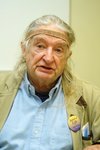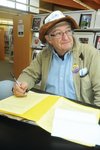

“To thine own self be true,” said Polonius in Shakespeare’s “Hamlet.”
Gaines Steer, a local member of the National Association of Personal Historians, and raconteur, would agree. But who are we?, he asks. What makes us who we are? Some would say that we are a collection of memories, that we look back into the past to really know who we are.
As for Steer, he uses his self-written memoir as a touchstone, a guide to his students in the process of finding themselves. His journey is documented in “A Story Worth Tellin,’” a work that shares the joys and sorrows of his life in 100 chapters — two divorces, time in the National Guard, and his life growing up in Greenwood, S.C., combine with joys on the farm, raising children, and his business, “The Last Unicorn.”
Steer is a creative writing specialist who holds a master’s degree in community leadership, and he is offering a free seminar on the art of creative writing — and how to find your writer’s voice — at the Pittsboro Library at 2 p.m. on March 7. His program is an introduction to those that want to preserve a family’s memories and stories in a memoir.
“Everyone’s life is interesting,” Steer says. “The legacy of personal history is a most important gift to your family and to yourself.”
Steer says that many people start thinking about creating a memoir while in their 60s, and write in their 70s. You may wait too long, he said, because if you wait until your 80s, these memories may be gone.
Another problem is the answer to the question, “Who are you writing for?”
“People think that they are writing for their grandkids,” Steer said, “but I’m sorry, they’re not interested, they don’t have a strong enough motive. One of the main points that I make to those with whom I work as a personal historian is the most frequent discovery that that memoir ‘is written for you.’ You are the beneficiary, instead of ‘the grandkids,’ as originally presumed in most cases. Memoir is potentially about discovery. Memories, lost to the active recall, surface in a most interesting and intuitive ways. This may be especially true if there is a ‘presence’ [a wordsmith] to aid in the telling and writing.”
These new writers discover that writing is an art form.
“When you discover the art form unique to you, it’s damn exciting,” Steer said.
The writing process for Steer involves remembering the past through writing prompts. These are more than 50 memory ticklers that Steer employs, such as the pets that you had over the years, tough times or the music played in the home. All of these can bring back associated memories.
One of Steer’s clients involved in writing a memoir now, Carmen Hogan, was using prompts and an outline when she began her work. She had stopped work on the project, but went back to work on her memoir with assistance from Steer. She’s been working with him now for several months. Hogan feels that Steer’s inspiration may do the trick, she said. She thought it would take about a year.
“Now I feel like I finally got some help to get it finished, or to the point where I am happy with it,” Hogan said. “People say they will write a book, but writing a book is a lot harder than people realize.”
Steer added, “It helps to have a wordsmith to get energy in writing, quotes, construction and energy.”
Hogan is using Steer’s guidance in writing her memoir. She decided to write one after a traumatic medical incident that changed her whole life. The incident created a dramatic short term memory loss. Her therapist suggested that she write a memoir, starting with one paragraph a day.
“I started out and next thing I knew I had seven pages,” she said. “I’m more about words [now] than analysis. It’s been cathartic.”
Part of Gaines’ seminar is to access the real “you,” whoever that may be, and to write in your authentic voice. It’s the discovery of your voice that makes your memoir unique. Steer worked on his memoir for about 10 years and published it in 2007. The voice came first.
“If you want to try and publish before you find your writer voice, you’ll become a boring writer without that,” he said.
Hogan added, “There is a difference between telling a story and writing a story, and one thing I learned is anyone can tell a story, but writing a story is a completely different ballgame.”
Photographer David Bradley can be reached at david@chathamnr.com.